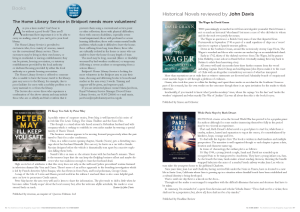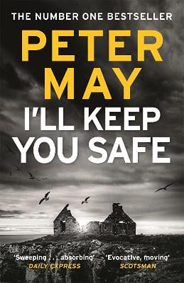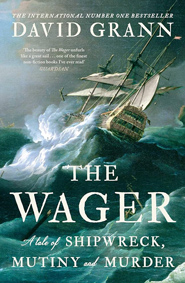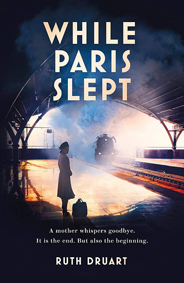
I’ll Keep You Safe by Peter May

A prolific writer of suspense stories, Peter May, is well known for his series of novels like The Lewis Trilogy, The China Thrillers and the Enzo Files.
This though is a stand-alone tale based around a Hebridean husband and wife company which is seeking to establish its own niche market by weaving a special variety of Harris Tweed.
The business venture appears to be moving forward progressively when the pair travel to Paris for a sales conference.
Then, in a roller-coaster opening chapter, Niamh (Neave) gets a disturbing message about her husband Ruairidh (Roo-are-ee), he leaves in a car with a female Russian designer before the vehicle is dramatically torn apart by a massive explosion killing them both.
Niamh’s life is in ruins as she returns home with her husband’s remains. There is the tenuous hope that she can keep the fledgling business afloat and maybe discover who was malicious enough to want her husband dead.
High on its list of attributes is that this story does not rely on the well-used ‘police procedural’ routine featured in television dramas like Vera and Grace. There’s more of an ad-hoc approach to the bombing investigation which is led by French detective Sylvie Braque, who has flown in from Paris, and local policeman, George Gunn.
A map of the Isle of Lewis and Harris proved useful in the edition I read and there is also some helpful guidance on how to pronounce Gaelic names.
Peter May knows the area very well and is keen to share the information. The plot tends to drift a little when he becomes rather ‘Hardy-esque’ about the local scenery but, after the welcome idyllic interlude, the reader is soon steered back on track. Review by John Davis
Published by riverrun, an imprint of Quercus Editions Ltd
The Wager by David Grann

This painstakingly researched novel from investigative journalist David Grann is not so much an historical ‘whodunnit’ but more a case of who did what to whom and do the ends ever justify the means.
The Wager in question is a British Navy man-of-war that departed from Portsmouth in September 1740 as part of a small squadron of ships on a ‘secret’ mission to capture a Spanish treasure galleon.
Down in the Southern Ocean, around the notoriously stormy Cape Horn, The Wager is wrecked and those who survive are washed up on an uninhabited island.
Early in 1742, thirty of the skeletal survivors from The Wager, led by gunner John Bulkeley, come ashore in Brazil before eventually making their way back to Britain to relate their harrowing story.
All seems well until six months later three further seamen from the vessel including Captain David Cheap and midshipman John Byron make it to the coast of Chile with an altogether contradictory account of what has transpired.
More than reputations are at stake here as witness statements are dissected and Admiralty boards of enquiry and court martials begin to sift through a plethora of evidence.
Grann, who took five years to collate his findings and spent three weeks on an island in the Southern Ocean as part of his research, has his own verdict on the outcomes though there is an open invitation for the reader to think otherwise.
Incidentally, if you wanted to know what ‘powder monkeys’ were, where the sayings ‘toe the line’ and ‘under the weather’ originated and what exactly The War of Jenkins’ Ear was all about then this is the book for you.
Published by Simon and Schuster
While Paris Slept by Ruth Druart

Fictional stories set in the Second World War has proved to be a popular genre for authors although for some readers immersing themselves fully in the period may be too visceral an experience.
That said, Ruth Druart’s debut novel is a good place to start for, while there is cruelty, sadness, hatred and separation to tug at the senses, it’s counterbalanced by kindness, hope, courage and love.
To deal with the logistics first. The book is written in dual timelines and multiple perspectives. The narrative is well organised though so each chapter is given a date, location and character name tag.
In terms of chronology, the outline plot is as follows:
It’s May 1944, a young Jewish couple, Sarah and David are rounded up in occupied Paris to be transported to Auschwitz. They have a young infant son, Sam. As she boards the train, Sarah makes a heart-rending decision, thrusting the bundle wrapped baby into the arms of a nearby French railway worker Jean-Luc who in turn takes the youngster home to his girlfriend Charlotte.
Nine years later, Jean-Luc and Charlotte, having survived life under the Nazis in France, have re-located to a new life in Santa Cruz, California where Sam is growing up in a situation where familial bonds have been established and a cultural identity is being developed.
That is until one day there is a knock on the door…
Throughout the reader is encouraged to empathise with the difficult dilemmas that arise and decisions that have to be taken.
In summary, I’m reminded of a quote from historian and scholar Yehuda Bauer: “Thou shalt not be a victim; thou shalt not be a perpetrator; but, above all, thou shalt not be a by-stander.”
Published by Headline Review




